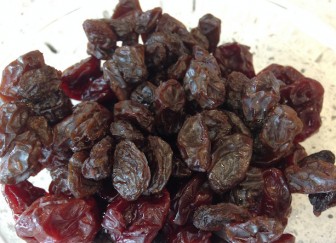
Dried Michigan cherries and raisins. Image: Flickr, Steven Depolo
By Michael Kransz
LANSING – In the past five years, more and more of Michigan’s dairy products and prepared fruits and vegetables have been on their way to China, according to export data from Euromonitor International Ltd.
From 2010 to 2014, the dollar value of dairy product exports to China skyrocketed 688 percent, according to the London-based economic analysis firm. In that same time period, the dollar value of prepared fruit and vegetable exports, which include dried tart cherries, rose almost four-fold.
Chris Wolf, a professor of agricultural, food and resource economics at Michigan State University, said U.S. dairy products – specifically powdered milk – took hold in the Chinese market following that country’s baby formula scandal in 2008.
The result of the scandal was a loss of confidence in domestic dairy products, Wolf said. And around the same time, U.S. milk prices were competitive with those of other countries China imported from, especially New Zealand, he said.
“We’ve become a reliable supplier in the last few years,” Wolf said.
China, with its burgeoning middle class, has been a trade target for Michigan’s government.
In late August, Gov. Rick Snyder and state Department of Agriculture and Rural Development Director Jamie Clover Adams travelled to China to tout the state’s products.
The trade mission, Clover Adams said, was two-pronged: to inform Chinese trade officials and potential buyers that Michigan exists and produces a variety of agricultural products, and to connect those buyers with Michigan businesses.
“The growth has been pretty good the last five years, but it’s pretty hard to predict what it will be, so we just continue to facilitate,” she said.
In her conversations with officials overseas, Clover Adams said tart cherries, blueberries, beans and dairy products were major products of interest.
Although Continental Dairy Facilities in Coopersville opened shop only in 2012, by 2014 it was exporting powdered milk to 14 countries and had nabbed a Michigan Agriculture Exporter of the Year award, said the company’s logistics and project coordinator, Chloe Pakalnis.
Along with exports to other countries, sales to China were a strong factor in winning that award, she said.
“We’re still exporting there and it seems like it’s starting to pick up even more so than it has the past few quarters,” Pakalnis said. “We were exporting pretty heavily in 2013, 2014, but it started to slow down in 2015.”
But it isn’t just Michigan dairy producers tapping into Chinese markets. Some fruit producers also have looked to China as a potentially profitable customer.
While exports to China represent only a small fraction of Graceland Fruit’s overall sales, the company in Frankfort has seen an explosion in growth: from shipping nearly 300,000 pounds of dried fruit several years ago to now more than three million, said Brent Bradley, the company’s vice president of sales and marketing.
“We’ve probably had 10-fold growth in China in the last three years,” Bradley said. “What we’re seeing is a greater acceptance from the Chinese consumer of imported products and a higher demand for what they may term as a safer product from what they can get in country.”
Bradley said the company anticipates that increase in exports to double within the next two years.
Randy Atwater, Shoreline Fruit’s international sales manager, said the Williamsburg company also is in the early stages of establishing trade relationships across mainland China.
“I think it’s rather important that we have a presence there and generate some market share for Shoreline Fruit,” Atwater said. “It’s such an area of importance.”
Like increased interest in dairy products, desire for Michigan’s fruits in China can also be attributed to the increased incomes in the country, MSU agricultural, food and resource economics specialist Mollie Woods said.
“There’s a lot of interest among processors in the state and what they have to do to get those markets,” Woods said.
Jamie Zmitko-Somers, the Agriculture and Rural Development international marketing program manager, said increasing international attention on Michigan’s fruits and other agricultural products highlights the variety grown in the state.
“It certainly tells the bigger story about the diversity here,” Zmitko-Somers said. “A lot of people don’t realize that agriculture has a strong presence in Michigan. Our diversity is second only to California.”
Michael Kransz is a reporter for Capital News Service.
